16 Top Tips from Blogging Experts for Beginners
I’ve heard blogging referred to a couple of times recently as a mixture between an art and a science. If this is true (and I think it is), there’s no ‘right way’ to approach blogging if you want to be successful. There are plenty of people who’ve done a great job of it though, and I thought it would be useful to learn from them.
These 16 bloggers shared one important tip each for blogging beginners. No doubt, even if you’re not a beginner these tips will probably prove to be useful.

1. Get ideas from your audience
Create blog posts that answer the most interesting questions from people you engage with on social media.
Dave Larson, founder of @tweetsmarter
This can be a great way to gather ideas of what topics people would most like to read about, which will help your blog grow! One of the best ways I’ve seen this in action is through blog comments or Tweets. In one example, here on FastCompany a lot of people requested a post that features more women entrepreneurs:
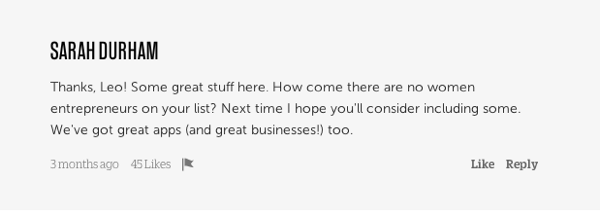
Now, a few weeks later adding such an article where just women contributed and built great businesses was a big hit:
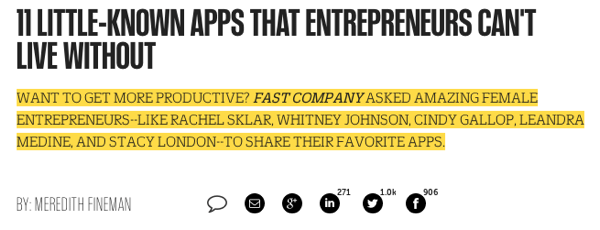

2. Understand your audience
Understand your audience better than they understand themselves. It takes a lot of upfront research, and often means being a member of the very tribe you’re trying to lead – but it pays off.
Brian Clark, founder and CEO, Copyblogger
Understanding your audience better means you’ll have a better idea of what blog content will resonate with them, which is a good start when you get to writing blog posts.
A great technique for doing this is to simply ask your readers first on Twitter, Facebook or LinkedIn with an engaging quote. If people respond well to it, than this is probably a great topic to write about. An example for this comes from Andrew Chen who famously “tests” his blogpost ideas on Twitter first.
And so does Joel here at Buffer. Take this example from a recent Twitter post of his, where he simply tweeted one quote to see how well people liked a topic before he blogged about it:


3. Write for yourself first
Write for yourself first & foremost. Ignore the fact that anyone else will read what you write; just focus on your thoughts, ideas, opinions and figure out how to put those into words. Write it and they will come.
Adii Pienaar, founder of PublicBeta
Adii’s experience in writing for himself firstly has made a difference to his blog in ways he didn’t expect:
Yes, since I’ve been writing for myself, I’ve found that I write more and I publish more often. I think though that the main reason for that is that I don’t decide whether to publishing something based on the traction / reception that the post will receive within my audience; instead if I want to publish something, I do so. For myself.

4. Build your email list
Start building your email list from day one. Even if you don’t plan on selling anything, having an email list allows you to promote your new content to your audience directly without worrying about search rankings, Facebook EdgeRank, or other online roadblocks in communications.
Kristi Hines, freelance writer and professional blogger
When you’re asking readers to sign up for your email list, you might want to try experimenting with different language. Willy Franzen found that his subscription rate jumped 254% higher when he changed his call-to-action from “subscribe by email” to “get jobs by email”:
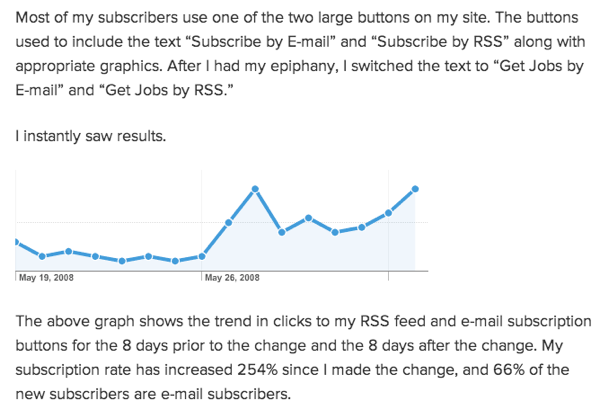
Using this phrase more clearly tells Willy’s readers what they’re signing up for, which clearly worked well!

5. Love your existing readers
Love the readers you already have. A lot of bloggers get quite obsessed with finding new readers – to the point that they ignore the ones they already have. Yes – do try to find new readers but spend time each day showing your current readers that you value them too and you’ll find that they will help you grow your blog.
Darren Rowse, founder of ProBlogger
Focusing on your readers is a great way to get to know them better (see tip #2). I love the way Daniel Burstein describes blog readers’ expectations of you as a blogger:
A blog is really two things. One, simply a piece of technology, a platform. But, two, it is a promise in the minds of most readers, who expect that the blog should have actual content with some elements of value that is hyper-targeted to their needs. Much like with a newspaper. Readers don’t just look at a newspaper as newsprint that is delivered on their driveway every morning. They look at it as valuable information about their city, where they live, and the things that they do.

6. Focus on building an amazing call-to-action
I screwed up for years. I’d blog and blog. Some of my posts were doing very well on places like Hacker News, but I had such hard time getting return visitors. And very few people bothered to follow me on Twitter.
Don’t rely on people to do the work to find your Twitter account. Don’t rely on them to do the work to find your details in a sidebar. People are blind to sidebars. Thanks banner ads!
Finish your blog post with some kind of call to action to signup for an email list or follow you on Twitter. When I started doing this, I immediately increased my Twitter followers by 335% in the first 7 days.
Nate Kontny, founder of Draft
Nate uses a simple call-to-action on his blog now, that looks like this:

This particular technique we’ve also tested here on the Buffer blog and found it to work amazingly well to bring attention to other blog posts we’ve written, like this:

or to Buffer product features, like this:


7. Give stuff away
Give away free content that adds value to people’s lives “until it hurts” and they will love you and become loyal fans.
Jeff Bullas, blogger and author of Blogging the Smart Way
A great example of this is the research done by Incentivibe, who found that adding a giveaway contest pop-up to the bottom-right of their website led to 125% more email subscribers.
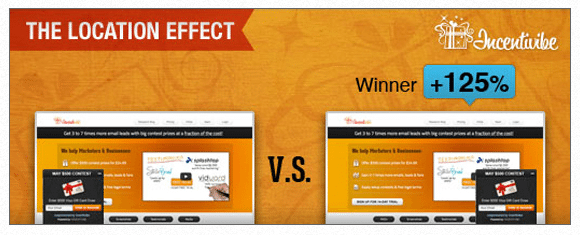

8. Be consistent
Consistency is one of the most important things that bloggers tend to forget. It’s much easier to lose your traffic than it is to build it up, so make sure you consistently blog.
Neil Patel, founder of KISSmetrics
A study by Hubspot showed that consistent blogging actually leads to higher subscriber growth rates:
Over a two-month span, businesses that published blog entries on a regular basis (more than once a week) added subscribers over twice as fast as those companies that added content once a month.
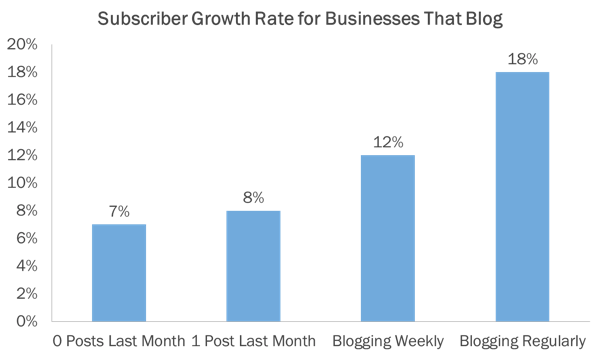

9. Give away your knowledge
Don’t be afraid to showcase what you know. Too many bloggers hold back the good stuff out of fear of giving away the “secret sauce.” There is no secret sauce in a world where everyone has high speed Internet access at all times. Today, you want to give away information snacks to sell knowledge meals.
Jay Baer, author of Youtility
Jay’s advice is to share the knowledge you have, rather than keeping it tucked away for a rainy day. Chris Guillebeau follows this advice by offering two free, downloadable PDFs to his readers. Chris also does what Jay calls giving away “information snacks to sell knowledge meals.” On both of the free PDF download pages, Chris markets his book on the right-hand side.


10. Be true to your voice
Stay true to yourself and your voice. People don’t care to follow sites so much as they care to follow people.
Chris Pirillo, founder and CEO, LockerGnome
Another blogger who advocates the importance of the writer’s voice is Jeff Goins. He says that your voice is the most important, yet over-looked part of blogging:
Writing isn’t about picking the right topic; it’s about finding the right voice. What matters, what readers really resonate with, isn’t so much what you say, but how.

11. Give it time – This is why
Plan to invest in blogging for a long time before you see a return. The web is a big, noisy place and unless you’re willing to invest more over a greater period of time than others, you’ll find success nearly impossible. If you’re seeking short-term ROI, or a quick path to recognition, blogging is the wrong path. But if you can stick it out for years without results and constantly learn, iterate, and improve, you can achieve something remarkable.
Rand Fishkin, CEO of Moz
Rand shared these great images with us from his wife’s travel blog, Everywhereist, which shows just how long it can take to see a return on your efforts:
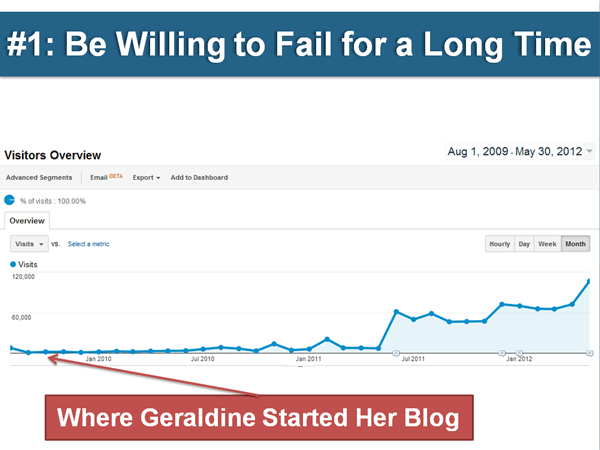
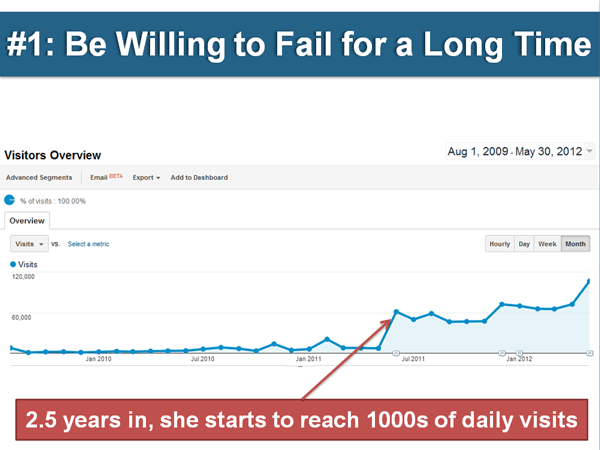

12. Give your email list priority
If you’re blogging to create a business, a movement, or to support a cause, then you need to build an email list. It’s not an option. I don’t even consider my blog to be my community, my email list is my community. Caring about these people, writing for them, and delivering value to them should be your number one goal.
James Clear, entrepreneur, weightlifter and travel photographer
When the New York Public Library focused on growing email subscription rates, this simple home page design with information about what readers could expect to receive boosted numbers by 52.8% over a more complicated version with less information about the actual newsletter:
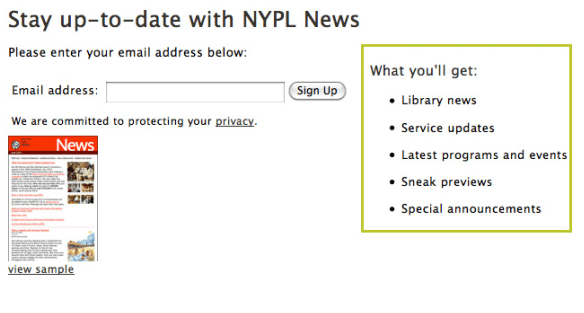

13. Write catchy headlines
No matter how great your content is, it won’t matter unless you have an amazing headline. People have a split second to decide if they should click on your post, and your headline will make them decide. The headline is also essential in making it easy and desirable for people to share your post. Keep your headlines SPUB: simple, powerful, useful and bold.
Dave Kerpen, author and CEO of Likeable Local
Something we do at Buffer is to test several different headlines for each of our blog posts to determine which ones works best. Here’s an example of what that might look like:
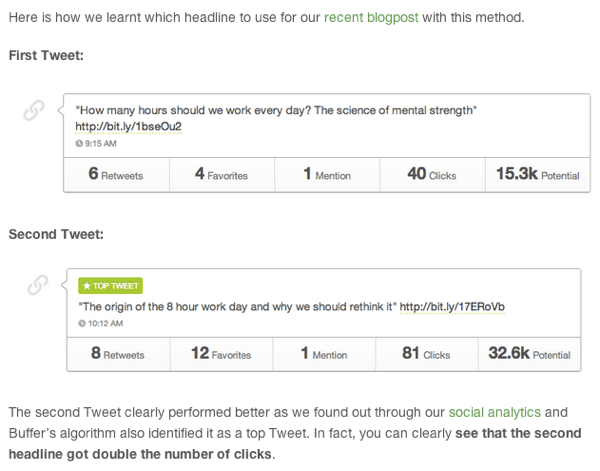
You can read more about this particular approach in more depth here: A scientific guide to writing great headlines on Twitter, Facebook and your Blog

14. Be Yourself
There isn’t one specific set of rules to be successful in blogging. When I started blogging, I had the opportunity to learn from experienced and successful bloggers in the industry. One of the best lessons I’ve learned from them is to simply be me. I didn’t have to be too “professional” or use “big words” to impress others. I had to simply be me.
By being me, I enjoyed writing and the process more. It had me writing more than I usually would too. If you look at the the most successful writers like Seth Godin and Chris Brogan you’ll notice that they are different and unique in their own ways.
Aaron Lee, social media manager, entrepreneur and blogger
Moz CEO Rand Fishkin agrees that telling your company’s story is important, as opposed to following a formula for successful blogging:
Emotion and storytelling have been part of how we communicate with each other and inspire action for thousands of years.

15. Keep it short
Biggest lesson I learned in my past year of blogging. Keep it in the 1–2 minutes read-time length.
Derek Sivers, founder of Wood Egg
Working out the best length for your blog posts can be tricky. You generally need about 300 words minimum to get indexed by search engines, but otherwise the length of your post is up to what you think feels best.
Derek Sivers noticed recently that his shorter posts were much better received by readers and seemed to be shared more, unlike his longer posts:
When I’ve written articles that were too long or had too many ideas, they didn’t get much of a reaction.
When I read books, I often feel bad for the brilliant idea buried on page 217. Who will hear it?
Stop the orchestra. Solo that motif. Repeat it. Let the other instruments build upon it.
The web is such a great way to do this.
Present a single idea, one at a time, and let others build upon it.
According to this Chartbeat graph below, many visitors to your site won’t bother scrolling, and most visitors won’t read more than about 60% of what you’ve written. Keeping it short and sharp then, could be worthwhile.
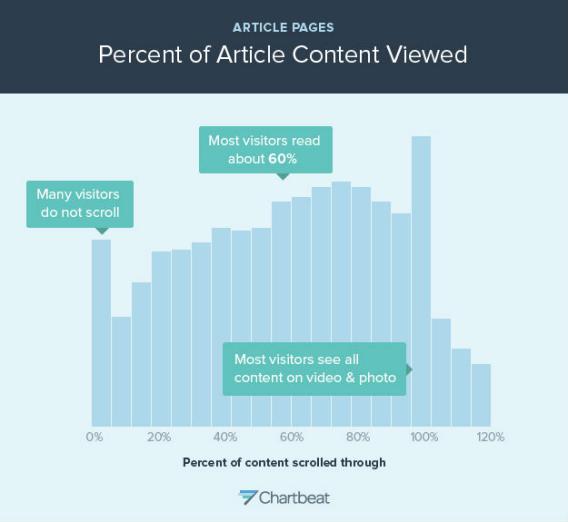
If you’re looking for a general guide to blog post length, Joe Pulizzi’s blog post, “A blog post is like a miniskirt” might be useful:
A blog post is like a miniskirt.
It has to be short enough to be interesting, but long enough to cover the subject.

16. Make it worth referencing – here is how:
One thing I always try to keep in mind before publishing a post is would anyone want to “cite” this for any reason? Just like interesting research is great because it leaves you with a fascinating finding or an idea, I like for my posts to be the same. That doesn’t mean relying on research, but simply making sure each post has an original lesson or actionable item, making it “citable” on the web.
Gregory Ciotti, marketing strategist at Help Scout
Our very own Buffer co-founder Leo has written about a similar thing before:
When writing a post, I get into a mindset to answer just this 1 question with a Yes: “Would anyone email this article to a friend?”
It’s an extremely simple proposition. Yet, it has changed my writing completely. If I put myself into a reader’s head going through a post and seeing whether someone will say “Oh, this is interesting, John will really like this”, then I go ahead and publish it. It’s almost like an invisible threshold to pass. I need to improve the post until this level is reached. I will iterate, find more research, get more examples, until I can truly imagine this happening.
I’m sure there are lots more great tips out there about building a blog. What’s your favorite?
Image credits: David G. Larson, Copyblogger, The WordPress Podcast, Party Biz Connect, Darren Rowse, Nate Kontny, Jeff Bullas, FounderTips, Social Media Examiner, Chris Pirillo, LinkJuice, James Clear, Dave Kerpen, Joshua Titsworth, Derek Sivers, Unbounce
Try Buffer for free
140,000+ small businesses like yours use Buffer to build their brand on social media every month
Get started nowRelated Articles

Sending ads by mail may seem like a thing of the past, but this marketer thinks it’s a surprisingly effective approach for e-commerce brands.

Learn how to leverage AI social media content creation tools and save valuable time in your social media marketing efforts.

With the newsletters on this list, you'll be able to stay on top of all developments in social media and learn from amazing experts